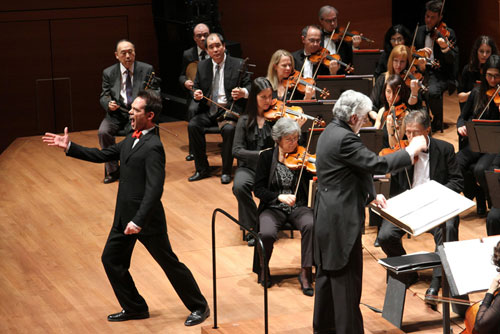
 |
|
Thomas Glenn sings the Chinese opera Siege of Tiger Mountain at the Lincoln Center in New York on Feb 16 as part of the I Sing Beijing program. Hu Haidan / China Daily |
A new program blends the best of Chinese and Western operas. Derek Bosko reports in New York.
There's no doubt that I Sing Beijing - a redolent blend of musicians, Western traditions and modern Chinese opera - is an important catalyst in the evolving relationship between the United States and China.
|
|
| Harmonic convergence, with his lips |
|
|
| Art highlights for 2013 |
But the performance, which made its US debut Feb 16 at the Lincoln Center's Alice Tully Hall, also is providing an unforgettable experience for a couple of dozen Western artists by introducing them to Mandarin as an idiom for classical singing.
Prior to the knockout performance, the singers participated in intensive Mandarin lessons, vocal coaching and stagecraft workshops with top coaches from New York's Metropolitan Opera, Seiji Ozawa Music Academy, Beijing's Central Conservatory of Music and the Shanghai Conservatory.
The fruits of those labors were much in evidence. The Western singers joined forces with rising stars from China in an eclectic program that included scenes and arias from the Western repertoire coupled with a historical tour of contemporary Chinese vocal works.
Xiaoli Meng-Lumpkin, a New York based therapist in the audience, says she was impressed with both the singers' skill and relative youth.
The company's performance of Happy Spring Awakening from the Chinese opera Zhi Qu Weihushan (Siege of Tiger Mountain) resonated loudly with her.